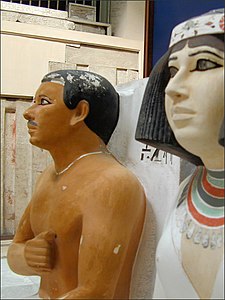Prince Rahotep
| Rahotep | |
|---|---|
| Prince of Egypt | |
 Statue of Rahotep | |
| Burial | |
| Spouse | Nofret |
| Issue | Djedi, Itu, Neferkau, Mereret, Nedjemib, Sethtet |
| Father | Sneferu or Huni |
| Mother | Sneferu's first wife or Huni's wife |
| Religion | Ancient Egyptian religion |
| Occupation | Priest of Ra |
Rahotep was a prince in ancient Egypt during the 4th Dynasty. He was probably a son of Pharaoh Sneferu and his first wife,[1] although Zahi Hawass suggests his father was Huni.[2]
| |
Biography
[edit]Rahotep’s titles were inscribed on a magnificent statue of him which, with a statue of his wife, was excavated from his mastaba at Meidum in 1871 by Auguste Mariette. These describe him as High Priest of Ra at Heliopolis (with the added title, unique to Heliopolis, Ra’s town, of "Greatest of Seers"), Director of Expeditions and Supervisor of Works.[3] He also has a title given to high nobility, "the son of the king, begotten of his body".[4]
Rahotep's older brother was Nefermaat I, and his younger brother was Ranefer. Rahotep died when he was young, and so his half-brother Khufu became pharaoh after Sneferu’s death.[5]
Rahotep’s wife was Nofret. Her parents are not known.
Nofret and Rahotep had three sons – Djedi, Itu and Neferkau – and three daughters – Mereret, Nedjemib and Sethtet. They are depicted in Rahotep’s tomb.[6]
Representations of Rahotep
[edit]-
Rahotep’s slab stela at the British Museum
-
Nofret and Rahotep's statue at the Egyptian Museum in Cairo
-
Nofret and Rahotep's statue at the Egyptian Museum in Cairo
-
Stele of Rahotep's mastaba, on display at the Louvre
References
[edit]- ^ Snofru, Rahotep's father Archived 2010-04-25 at the Wayback Machine
- ^ Hawass, Zahi A. (2006). Mountains of the Pharaohs: The Untold Story of the Pyramid Builders. Doubleday Books. p. 22. ISBN 978-0-385-50305-1.
- ^ Rice, Michael (1999). Who's who in Ancient Egypt. Routledge. p. 164. ISBN 978-0-415-15448-2.
Rahotep priest nofret.
| - ^ El-Shahawy, Abeer (2005). The Egyptian Museum in Cairo: A Walk Through the Alleys of Ancient Egypt. Dar al-Mushaf. p. 71. ISBN 978-977-17-2183-3.
- ^ Rahotep and Nofret Archived 2012-04-14 at the Wayback Machine
- ^ Dodson, Aidan; Hilton, Dyan (2004). The Complete Royal Families of Ancient Egypt. London: Thames & Hudson. ISBN 0-500-05128-3.,
- ^ The Oxford History of Ancient Egypt, Ian Shaw, c 2000, p. 129.





![Nofret-(Nfr-t) (from the statue)[7]](http://upload.wikimedia.org/wikipedia/commons/thumb/b/b2/Nofret_statue.jpg/400px-Nofret_statue.jpg)